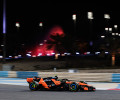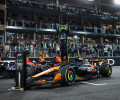FIA holds meeting regarding the future of Formula One power units
Saturday, 1 April, 2017
The FIA yesterday hosted a meeting to commence discussions on the direction of power units for the FIA Formula One World Championship from 2021.

Held at the Federation’s Paris headquarters and chaired by FIA President Jean Todt, the meeting was attended by a variety of Formula One’s key stakeholders, including representatives of the FIA, the new Commercial Rights Holder, current Power Unit suppliers, as well as automotive manufacturers and independent suppliers not currently involved in F1.
A number of the attending automotive manufacturers were also represented by their road car arms.
The meeting resulted in broad agreement for the future evolution of Formula One power units, with all parties seemingly aligned in their focus on:
- a desire to maintain F1 as the pinnacle of motor sport technology, and as a laboratory for developing technology that is relevant to road cars
- striving for future power units to be powerful, while becoming simpler and less costly to develop and produce
- improving the sound of the power units
- a desire to allow drivers to drive harder at all times.
FIA President Jean Todt chaired the meeting, and was enthused by the positive discussion.
“I was very pleased with the process, and the fact that so many different stakeholders were able to agree on a direction for the FIA Formula One World Championship in such an important technical area,” said Mr Todt.
“Of course, now we must sit down and work through the fine details of exactly what the 2021 power units will be – but we have begun on the right foot, and I am looking forward to working through the process to come up with the best decision for Formula One into the future.”
The FIA Formula One World Championship is committed to running the current 1.6-litre six-cylinder turbo hybrid power units until 2020. The current units have demonstrated astonishing technological advancement, producing between 900 and 1000 horsepower, while saving 30 per cent on fuel consumption compared to previous generation engines, and approaching the magic 50% thermal efficiency number – a figure that was unheard of three years ago.
From 2021, the championship can introduce a new power unit configuration.

 Facebook
Facebook Twitter
Twitter






